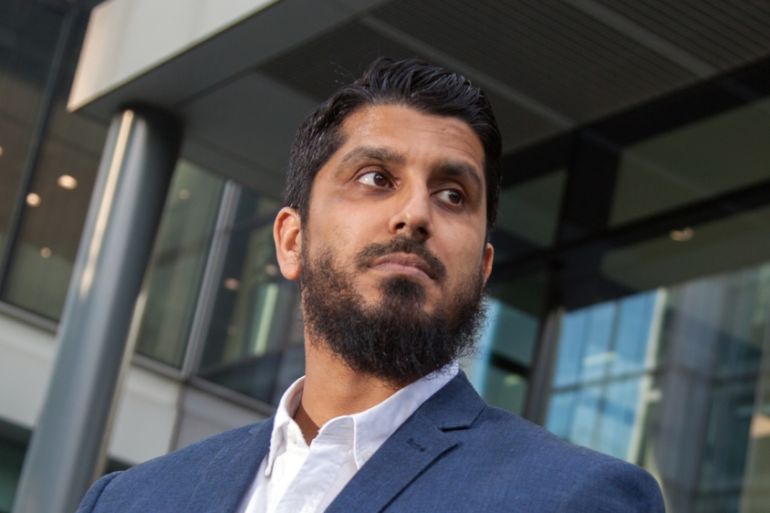The activist taking on the UK’s invasive ‘terror laws’
CAGE’s Muhammad Rabbani is standing up for the privacy of us all by refusing to hand over his passwords to authorities.

Those making a journey to the UK, whether for work, holiday or study purposes may be asked to hand over the passwords to all their devices by police at ports of entry, even if there is no suspicion of a crime. This is the reach of Schedule 7 of the Terrorism Act, which now compels individuals to hand over the keys to their digital worlds upon police request.
This development has startling implications for lawyers, doctors, teachers, human rights defenders and NGO workers, who all carry information entrusted to them by their clients.
Keep reading
list of 4 itemsHunter Biden sues Trump ally Rudy Giuliani over data breach allegations
Evolving threats: The state of personal data protection in Brazil
X Blue users will need to send selfie, data to Israeli software company
It is also alarming to any individual who values their privacy. Our digital devices are doorways, not only to our world but to the lives of countless others as well. They hold all of our personal information, from intimate family photos to confidential work documents.
READ MORE: Cage activist faces charges for not giving up passwords
Now, a pending legal challenge involving Muhammed Rabbani, a director of CAGE, an advocacy organisation that campaigns against the abuses of the ‘War on Terror’, aims to challenge the broad reach of Schedule 7 and stand up for the right to privacy.
Government data shows that some 20,000 people were detained under Schedule 7 upon entry into the UK last year, 88.4 percent of them non-white. A massive 99.98 percent of people were not charged with any offences but still had to undergo the hassle and trauma of being detained.
Data collection on a massive scale
|
|
Detention at entry under Schedule 7 means an individual is taken into a secluded room to be interrogated and to have all their personal belongings searched. They must answer questions, hand over all their electronic devices, and divulge their passwords. There is no right to remain silent and no right to refuse.
Questions centre on you as an individual, your work, what time you finish work, which cafes you visit, and what organisations you are involved with. There are questions about your political views, for example, what you think about the Iraq War or Palestine.
What these stops amount to is data collection on a massive scale and an intrusive attempt under the banner of the “War on Terror” to monitor and record the beliefs of large numbers of people. The legislation is so broad in its scope that it allows for any political view or belief system that falls foul of the state-sanctioned one, to be incorporated into the police line of questioning.
Questions abound about what happens to this data once it is confiscated. Where is all this data being stored? With who is it being shared, what other security services? How does one remove oneself from these databases once you are “marked” at a port of entry?
Privacy advocates and civil liberties groups including Liberty and Privacy International have spoken out against the broad reach of Schedule 7 and now Rabbani, with the support of CAGE, is taking action to challenge the law.
OPINION: UK’s most extreme surveillance law
Rabbani’s case is made all the more compelling and important because when he was detained at Heathrow airport in November last year and asked to hand over his passwords, he refused because he was carrying crucial testimony, evidence of torture that implicates high-ranking officials.
He said it was a split second decision he made, something that any reasonable person in his position would have done to protect his client, especially if the client was a torture survivor. When he took this principled stance, even though he cited client confidentiality as his reason, he was arrested.
Rabbani reports to police in London on Wednesday to find out whether they will pursue terrorism charges against him. His position comes with the support of the Open Rights Group and the Courage Foundation, as well as CAGE’s many followers.
If the case moves to trial, it will be a landmark one for privacy advocates. However, we must not lose sight of another critical element of this case, namely that Rabbani was protecting crucial evidence in the course of representing his client and being forced to disclose such evidence would be a gross miscarriage of justice.
Karen Jayes is the award-winning author of the 2003 novel For the Mercy of Water (Penguin SA). She worked as a journalist for various publications in South Africa and the UK. She is the spokesperson for CAGE Africa, a branch of CAGE advocacy group in the UK.
The views expressed in this article are the author’s own and do not necessarily reflect Al Jazeera’s editorial policy.
